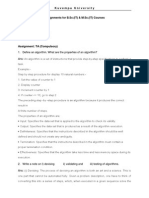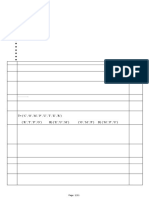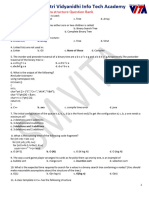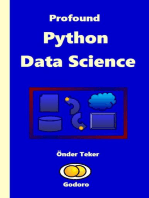0 ratings0% found this document useful (0 votes)
101 viewsComputer Programming Sample Questions
The document contains sample computer programming questions and their possible answers. Specifically, it includes questions about:
- The output of a sample while loop program
- The output of a function that modifies and returns a value
- Key terms related to arrays
- Conditions for a graph to be Eulerian
- Probability of inserting a new record into a hash table
- Where an element larger than all others would be inserted in a max heap
- Whether sample code to delete the first element of a linked list would work properly in all cases
- The contents of a queue after various add and delete operations
- Time complexity of linear search
- Postfix notation of a mathematical expression
Uploaded by
vaishali0000Copyright
© © All Rights Reserved
Available Formats
Download as DOCX, PDF, TXT or read online on Scribd
0 ratings0% found this document useful (0 votes)
101 viewsComputer Programming Sample Questions
The document contains sample computer programming questions and their possible answers. Specifically, it includes questions about:
- The output of a sample while loop program
- The output of a function that modifies and returns a value
- Key terms related to arrays
- Conditions for a graph to be Eulerian
- Probability of inserting a new record into a hash table
- Where an element larger than all others would be inserted in a max heap
- Whether sample code to delete the first element of a linked list would work properly in all cases
- The contents of a queue after various add and delete operations
- Time complexity of linear search
- Postfix notation of a mathematical expression
Uploaded by
vaishali0000Copyright
© © All Rights Reserved
Available Formats
Download as DOCX, PDF, TXT or read online on Scribd
You are on page 1/ 2
Computer Programming Sample Questions
questionStatement answerA answerB answerC answerD answerE
Shravanti writes the following program:
integer i = 0, j
while ( i < 2 )
{
j = 0;
while ( j <= 3*i )
print j
print <i>blank space</i>
j = j + 3
}
print \takes the cursor to the next line
i = i + 1
What will be the output of the program?
0<br/>0
3
0 3<br/>0
3 6
0<br/>0
3
6<br/>0
3 6 9
0 3 6<br/>0
3 6 9<br/>0
3 6 9 12
Consider the following code:function modify(a,b) integer c,
d = 2
c = a*d + b
return c
function calculate( )
integer a = 5, b = 20, c
integer d = 10
c = modify(a, b);
c = c + d
print c
Assume that a and b were passed by value. What will be the
output of the function calculate( ) ? 80 40 32 72
Smallest element of an array's index is called its
lower
bound range
upper
bound extraction
For a path to be Eulerian, which of the following conditions
are necessary and sufficient?
Degree
of each
vertex in
the
graph
should
be even.
Degree of
each
vertex in
the graph
should be
odd.
The
graph
should
have
even
edges.
The graph
should
have odd
edges.
A hash table can store a maximum of 10 records. Currently
there are records in locations 1, 3, 4, 7, 8, 9, 10. The
probability of a new record going into location 2, with a
hash function resolving collisions by linear probing is 0.6 0.1 0.2 0.5
We have a max heap with n elements. We insert an
element which is larger than all elements in the heap.
Where will it be inserted?
Top of
the heap
Bottom of
the heap
Some
where in
between
the
heap.
Cannot be
determined
A list is implemented as a singly linked link-list. The address
of the first and last node are stored in variables <i>first</i>
and <i>last</i>. Given the address of a node is given in the
variable <i>node</i>, the element stored in the node can
be accessed by the statement <i>node->data</i> and the
address to the next node can be accessed by <i>node-
>next</i>. Yusuf writes the code to delete the first element
from the linked-list. He writes the following function, where
first and last are passed by reference.
function deleteElement(first, last)
if (first isequal null
{ print "List empty" }
else
{
first = first->next
}
}
In which of the following scenarios will the code not work
properly?
When
the list
has no
elements
When the
list has a
single
element
When
the list
has two
elements
It will work
well in all
possible
cases.
Q is an empty queue. The following operations are done on
it:
ADD 5
ADD 7
ADD 46
DELETE
ADD 13
DELETE
DELETE
ADD 10
What will be the content of Q after these operations. Front
is marked by (F) and Rear is marked by (R).
10(R)
13(F) 5(R) 10(F)
13(R)
10(F) 10(R) 5(F)
Time complexity of linear search algorithm is O (log n) O (n) O(n^2) O(1)
Postfix form of ((A + B) * C - (D - E) ^ (F + G)) is
AB + C *
DE - FG +
^ -
AB + C *
DE - F - G
+ ^
ABC + *
DE - - FG
+ ^
^ - * +ABC -
DE + FG
You might also like
- Computer Prog QUESTIONS and ANSWERS-Vamsi (75 Questions With Answers)65% (20)Computer Prog QUESTIONS and ANSWERS-Vamsi (75 Questions With Answers)88 pages
- CS 159 - Spring 2021 - Lab #11: Contact PriorNo ratings yetCS 159 - Spring 2021 - Lab #11: Contact Prior6 pages
- 24 - Practical Poker Math (Pat Dittmar)No ratings yet24 - Practical Poker Math (Pat Dittmar)252 pages
- Syllabus For Amcat Programming Questions: Topic SubtopicsNo ratings yetSyllabus For Amcat Programming Questions: Topic Subtopics10 pages
- Xii - Computer Science (083) Ncert - Questions: Number Content NumberNo ratings yetXii - Computer Science (083) Ncert - Questions: Number Content Number22 pages
- S A) / (D Y R K: Data Structures and Algorithms Analysis Midterm QuestionsNo ratings yetS A) / (D Y R K: Data Structures and Algorithms Analysis Midterm Questions4 pages
- Define An Algorithm. What Are The Properties of An Algorithm? AnsNo ratings yetDefine An Algorithm. What Are The Properties of An Algorithm? Ans9 pages
- Answer All Questions. 2. Write Legibly On Both Sides of The Answer Book. 3. Write Relevant Question Numbers Before Writing The AnswerNo ratings yetAnswer All Questions. 2. Write Legibly On Both Sides of The Answer Book. 3. Write Relevant Question Numbers Before Writing The Answer4 pages
- Final HSSC-II Model Paper Computer ScienceNo ratings yetFinal HSSC-II Model Paper Computer Science9 pages
- SAMPLE PAPER-II - Class XII (Computer Science) QP With MS BPNo ratings yetSAMPLE PAPER-II - Class XII (Computer Science) QP With MS BP9 pages
- Final Model Paper Computer Science HSSC-IINo ratings yetFinal Model Paper Computer Science HSSC-II9 pages
- Du MSC Computer Science: 1) What Will Be The Output of The Following Code Segment Written in C++?No ratings yetDu MSC Computer Science: 1) What Will Be The Output of The Following Code Segment Written in C++?17 pages
- ALL-In-OnE XII CS PB QP MS 2024-25 From Know Python BytesNo ratings yetALL-In-OnE XII CS PB QP MS 2024-25 From Know Python Bytes339 pages
- Technical Comprehension: Statemen T Passage Answ Era Answer B Answerc Answ Erd Ans Wer ENo ratings yetTechnical Comprehension: Statemen T Passage Answ Era Answer B Answerc Answ Erd Ans Wer E10 pages
- Questionstatement Answera Answerb Answerc Answerd Answ EreNo ratings yetQuestionstatement Answera Answerb Answerc Answerd Answ Ere2 pages
- Electronics and Semi-Conductor Sample Questions: Questionstatement Answera Answerb Answerc Answerd AnswereNo ratings yetElectronics and Semi-Conductor Sample Questions: Questionstatement Answera Answerb Answerc Answerd Answere1 page
- Quantitative Ability (Technical Questions) : Directions Questionstatement Answera Answerb Answerc Answerd AnswereNo ratings yetQuantitative Ability (Technical Questions) : Directions Questionstatement Answera Answerb Answerc Answerd Answere1 page
- Logical Ability: Directions Questionstatement Answera Answerb Answerc Answerd AnswereNo ratings yetLogical Ability: Directions Questionstatement Answera Answerb Answerc Answerd Answere2 pages
- Questionstatement Answera Answerb Answerc Answerd Answ EreNo ratings yetQuestionstatement Answera Answerb Answerc Answerd Answ Ere2 pages
- Previous Year Question Paper Summative Assessment-Ii Class: Vii Subject: MathsNo ratings yetPrevious Year Question Paper Summative Assessment-Ii Class: Vii Subject: Maths3 pages
- C2W3 Lab 01 Model Evaluation and SelectionNo ratings yetC2W3 Lab 01 Model Evaluation and Selection21 pages
- JEE (Main) 2021: PAPER-1 (B.E./B. TECH.)No ratings yetJEE (Main) 2021: PAPER-1 (B.E./B. TECH.)14 pages
- Computational Neural Networks Driving Complex Analytical Problem SolvingNo ratings yetComputational Neural Networks Driving Complex Analytical Problem Solving7 pages
- The Stiffness Matrix For The Poisson ProblemNo ratings yetThe Stiffness Matrix For The Poisson Problem3 pages
- Boyce/Diprima 9 Ed, CH 2.1: Linear Equations Method of Integrating FactorsNo ratings yetBoyce/Diprima 9 Ed, CH 2.1: Linear Equations Method of Integrating Factors15 pages



































































































